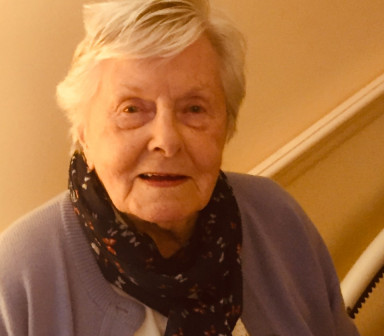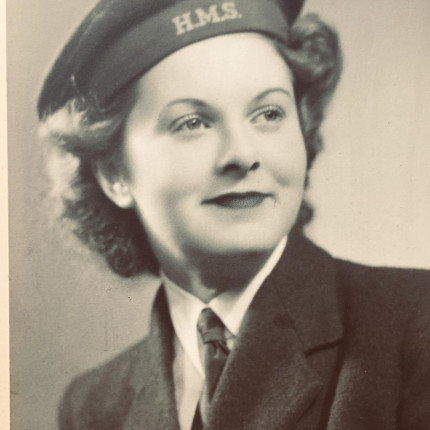This story was first published in 2019 when Sight Scotland Veterans was known as Scottish War Blinded.
WWII WRNS veteran Barbara Jenkins became a member of Scottish War Blinded in December last year and attends the recently established Largs lunch group.
Barbara, 94, of Largs, became a Leading Wren while based in the Admiralty in London from 1943 to 1946.
Here, she shares her memories of life when, aged 19, she travelled south from her then-home in Glasgow’s West End to work in London’s underground complex, which she now thinks was connected to Churchill’s war rooms.
She also recalls her experiences in the UK capital as the war finally came to an end.

Life in wartime London as a Wren
“I applied to join the WRNS when I was 18, when my parents couldn’t stop me. I think it was the uniform that appealed to me! I had a friend who was in the WRNS as well.
“I was 19 when I actually went down to London. You had two weeks of ‘indoctrination’ where you scrubbed floors. That I can recall was no fun – until then I’d never got up at six o’clock in the morning in my life!
“They gave you a blue uniform and because I was so small it was way down my legs. I remember scrubbing a floor with the tears rolling down – it wasn’t even a room, it was just a corridor.
“Then we were assessed – we were taken to some place, no idea where. There were telephone exchanges where they had the chords and you had to plug them in. For some unknown reason I showed aptitude and was able to do it very quickly.
“They sent me to the Admiralty in London. We were in a block of flats in Bayswater which were very comfortable, they must have been very expensive. The ground floor was very grand. We were divided into watches and because it was flats each watch had their own flat. I was in D watch, so we were in the top floor where we had balconies. It was great because we all went on duty at the same time so no one was ever waking anyone up.
“We had our own little bus to take us Wrens to the Admiralty. We worked in the network where Churchill had his war rooms. To get there we used to go past Buckingham Palace and along The Mall, underneath Admiralty Arch and then down Whitehall and go down a little road on the left which took you down to the river, and we went in a door there.
“We used to try and work out where we went after that but we had no idea because we went down in lifts and along corridors and round corners and into our particular bit of ‘tube’. Our section had a curved roof and it was a bit like being in the Tube. “When bombs started falling we were very glad to get down behind our huge steel doors.
“The bit I was in was new and I don’t think it had quite been finished because eventually we went in at the Admiralty itself and again down more corridors and such, so where we ended up I don’t know.
“I was told that where we were was at the end of Pluto – a communication point which went from Britain to France – but that was just hear-say, I don’t know if it was true or not.
“Churchill’s rooms must have been connected with where we were but we weren’t aware of that at the time. It was obviously a network. There were floors with holes and pipes and things and you could see that there was another corridor underneath.
“You were sat for four hours, teleprinting. You were sending signals. You used to sit and think, ‘oh, it’s only five minutes gone’ and it felt like an hour. You couldn’t wait to get back and get out to all the forces clubs.
“At the forces clubs you tended to often meet the same people who were working in London as well. When the Americans came over, up until then if you danced it was very politely, and of course they did this jitterbug stuff. We had great fun.”
News of the D-Day landings, 6 June, 1944
“As D-Day approached, we all knew something was going to happen. London was being bombarded with these awful doodlebugs, they were terrifying. I’m serious when I say I was petrified. I used to go and lock myself in the bathroom – I don’t know what good I thought that was going to do. And they had incendiary bombs. We had firewatchers as well and had to take turns.
“On D-Day I was on duty and I remember the flurry of canisters shooting upwards with communications, though we had no way of knowing what these messages were.
“I must have been on duty in the morning because in the afternoon we had some French Wrens coming to the wrenery. The radio was on and they were talking about the landing and the advance, and somebody said to these French women, ‘You’ll want to get back to hear what’s going to happen in France?’ And they sort of said, ‘Oh, we’ll learn soon enough.’
“We were horrified because they weren’t upset about this is any way whatsoever. I don’t think anybody said anything but I remember being a bit horrified that they didn’t want to get back to be with their own people when their country was being liberated, little as I knew about the world at that time.
“Because we were this exchange, after D-Day our work naturally just went on. There was no indication it would finish soon.”
VE Day, 8 May, 1945
“VE Day was incredible, a wonderful atmosphere. It was beyond belief.
“We heard the announcement on the radio. We heard Churchill speak, and then I think he announced it was to be ‘VE Day’.
“I felt very relieved at the news. With the doodlebugs at that time, I think my first thought was ‘Thank goodness I don’t have to hide in the bathroom anymore!’
“I think we were on night duty because I know we ate and at six o’clock set off for the West End. We walked to Buckingham Palace to see the Royal family. They came out onto the balcony, we were very close.
“We were in Green Park and everywhere was just jammed. Drink was impossible - I think we got half a pint of beer which wasn’t my cup of tea! There were six of us and we met six sailors which was very opportune because it was so crowded and it was frightening, so we were very glad of them as they saved us from being squashed. They were very good, they bored holes for us through the crowd and looked after us.
“We got as far down as Trafalgar Square and the admiralty. There were people with little fires lit in Trafalgar Square, metaphorically cooking sausages, and I remember there was a canopy just off Trafalgar Square with all these airmen up at the top drinking beer.
“By that time I’d been promoted to a Leading WREN, so they said I could go out again if I wanted until one or two in the morning. Nobody was doing anything. But I think by that time I was pretty knackered!”
VJ Day, 15 August, 1945
“On VJ night I was actually at the Albert Hall as we used to go to the Proms all summer (I went to the theatre and concerts a tremendous amount because I love music and the theatre – you could go to a little hut in Leicester Square that on the day of performance would give out tickets from the theatres, which we got for free, but you didn’t know what you were going to see.)
“They announced that whatever they were playing would stop at 9pm because the King and Churchill would speak, and half the audience were furious! Churchill and the King didn’t interest them, they just wanted the music, so there was a bit of banging and shouting.
“It was a horrible night, pouring with rain. My friend Margaret was with me, and we came out of Albert Hall into the rain and decided we would go and see Churchill. We were close by because we’d been at the Albert Hall. Churchill looked as though he was in a very merry mood!
“I was in London for another year after that. I carried on working doing the same role. I came out of the WRNS in 1946. I wanted to stay down in London, but my parents weren’t very happy about that so I came home.”
